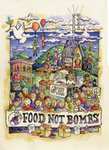FACISM
1. Powerful and continuing expressions of nationalism.
2. Disdain for the importance of human rights.
3. Identification of enemies/scapegoats as a unifying cause.
4. The supremacy of the military/avid militarism.
5. Rampant sexism.
6. A controlled mass media.
7. Obsession with national security.
8. Religion and ruling elite tied together.
9. Power of corporations protected.
10. Power of labor suppressed or eliminated.
11. Disdain and suppression of intellectuals and the arts.
12. Obsession with crime and punishment.
13. Rampant cronyism and corruption.
14. Fraudulent elections.
If we had a warning system scale alerting us to Facism in American government where would you rate us on the following scale?
1. LOW RISK........2........3........4........5. MODERATE......6.......7........8.......9.......10. HIGH RISK
I want my Democracy back....Hopefully the new Congress will go about restoring our democracy by restoring the checks and balances, repealing the Patriot Act, and investigating the fraudulent elections and rampant cronyism and corruption.....
Buzz...Buzz....
Sunday, December 31, 2006
Subscribe to:
Post Comments (Atom)












4 comments:
It's FASCIST, not FACIST
You want your "democracy back"?!?!? Uh, it's a republic, nimrod. It's never been, and was never created to be, a "democracy."
Thank you Joseph for the correction...you are absolutely correct....
James Young....
I'll simply quote William Meyers here, "Lately, from politicians, radio-talk show hosts, and other commentators, we have heard that we should forget about democracy, because the U.S.A. is a republic. But some questions are being posed by democracy advocates: What is a republic? What is a democracy? Should the United States be a mere republic, or a genuine democracy?
Republicans and other democracy detractors point to the U.S. Constitution and bits of history, and say, "See, the Founding Fathers who wrote the Constitution gave us a Republic. They believed democracies were dangerous and unworkable."
On that, they are partly right, but they fail to mention that democracies and republics overlap. They are not opposites. And they fail to account for the history of American government since 1788, much less the debates that took place in America prior to 1788, when the U.S. Constitution was substituted for the Articles of Confederation.
Democracy means rule of the people. The two most common forms of democracy are direct democracy and representative democracy. In direct democracy everyone takes part in making a decision, as in a town meeting or a referendum. The specific rules may vary: perhaps everyone must agree, perhaps there must be consensus, perhaps a mere majority is required to make a decision. The other, better known form of democracy is a representative democracy. People elect representative to make decisions or laws. Again, specifics vary greatly.
And, surprise, a representative democracy is a kind of republic. What distinguishes a republic is that it has an elected government. Representative democracies are, therefore, a kind of republic.."
May I remind you that George Bush constantly says he is trying to make Iraq a "U.S. style of democracy..." D'uh...
Corrected the spelling...I couldn't stand the thought of it making it to the archives with the bad spelling...Would you believe I was a spelling bee winner in elementary school?
Well hopefully my brain will rejuvenate when I sleep tonight to prepare for 2007.....
Buzz...Buzz...happy new year to all...
Post a Comment